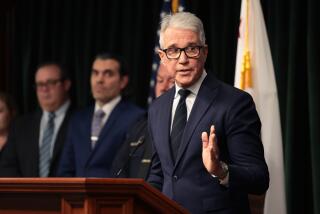Paradyne Reaches Accord, Averts Trial in Fraud Case
- Share via
TAMPA, Fla. — Two days before its trial on fraud charges, Paradyne reached a settlement with the federal government under terms that the electronics firm called “quite acceptable.”
The Securities and Exchange Commission had accused Paradyne of lying to get a competitive $115- million contract from the Social Security Administration in 1981 to computerize the federal agency’s field offices. It was the largest job in the history of the agency and Paradyne.
Pledges Not to Break Rules
In the settlement, approved by U.S. District Judge William Castagna on Monday, the Largo, Fla.-based firm, without admitting or denying any wrongdoing, pledged to follow all SEC disclosure regulations when it sells stock.
The SEC regulates sale of stock to the public.
“We are pleased to conclude this litigation on terms which the company believes are quite acceptable,” said Robert S. Wiggins, Paradyne’s president, chairman and chief executive.
“The settlement does not require the filing of any corrective reports as initially sought by the SEC in its complaint,” a company statement explained.
“Basically, we agreed to comply with certain provisions of federal securities laws, which we have to do anyway,” said George Pressly, a senior vice president.
The SEC also was pleased.
“We got an injunction enjoining Paradyne,” said Michael K. Wolensky, regional administrator of the agency’s Atlanta office. “All we ever sought was an order preventing violations in the future.”
Paradyne still faces other difficulties stemming from the Social Security contract. Despite the longstanding controversy, Paradyne still has the contract.
The federal government is weighing a recommendation to bar the firm from future government contracts. A federal grand jury reportedly is conducting an investigation. A major competitor for the job has a civil suit pending, as do some Paradyne shareholders, upset over the fall in the value of their stock.
Paradyne, incorporated in 1969, reported a $9-million loss for its most recent quarter. It also has laid off 200 of its 4,000 workers.
The SEC complaint alleged that Paradyne faked a demonstration during the bidding process by showing equipment that was neither fully developed nor Paradyne’s.
When Paradyne couldn’t develop the computer’s brain in time for the demonstration, it used another and presented it as its own, the SEC alleged. A scrambler, the government charged, was “nothing more than an empty box with blinking lights.”
The SEC also contended that the equipment delivered never worked properly.
Paradyne vehemently denied the charges, insisting that it won the contract fairly and that the SEC didn’t understand business in the highly competitive computer industry.
The “empty box” was intended merely to show how the final product would work, the firm said.
Paradyne claimed that computer companies often purchase equipment from other manufacturers and use it as part of a customized system under one name.
And the company countered that Social Security knew and accepted the fact that part of the equipment used during the demonstration was still in the preliminary stages of development.
Paradyne also pointed to Social Security’s 1984 renewal of the contract for $30 million as proof that the system not only works but that the agency was pleased with it. It said that if anyone was upset, it should be Social Security, not the SEC.










